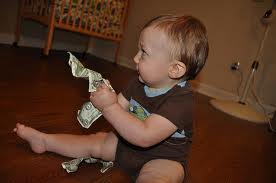Most parents are horrified when they receive a note sent home
from day care that their child has bitten someone. Some of our
own mothers and grandmother's would advise us "Bite him back,
then he won't do it again, it worked with my kids". As child
development specialists we do not advocate biting a child back,
since this only teaches a child that it is indeed ok to bite
when they are angry. However, we can offer some other
suggestions as to why biting behaviors occur and how to remedy
them.
Toddlers bite for several reasons, many because they simply lack the
language skills to tell someone "I am SO mad", or "You are in my space".
They may also bite because they are over-tired, teething or have a need for
extra oral stimulation. Some kids bite because they are over stimulated by a
situation or overly excited. And, some may just do it to see what someone's
reaction is when they do it. The best way to understand biting is to find
out which one of the above reasons led to the bite. From there parents and
caregivers can start to work on ways to prevent future biting episodes by
asking:
- What happened right before your child bit someone?
- Who did he/she bite and what were they doing at the time?
- Where was your child when they bit (home, daycare, play ground)?
- Does your child always bite the same child/adult?
Next look for ways to intervene before your child bites. For example, if
a child is biting due to the need for oral stimulation, offer him something
appropriate to chew on such as food or a sensory chew tube. If a child is
biting when others get too close, intervene by telling him "I know you don't
like when Stevie gets too close to you, use your words and tell him, do not
touch my hair". If your child is over-tired adjust his sleep schedule or
avoid play dates when he is tired. If your child is teething offer a
teething toy or cold washcloth to chew on. At other times you may be able to
intervene simply with distraction and move the child elsewhere before too
much frustration or anger sets in and leads to a bite.
When a child does bite here is what to do:
- Be calm and do not address the situation unless you can do so in a calm matter of fact tone.
- Keep your words firm, simple and clear (but not angry) saying "Biting hurts, we do not bite" and separate the child from the situation. Also make the child aware of the other child's feelings by saying "You hurt Christine, look at her she is crying because you bit her. Biting hurts'. Many times parents & caregivers focus too much attention on the biter and not the child who was bitten and even though the attention is negative this may be an incentive for the child to bite again. Try to give more attention to the child that was hurt and less attention to the biter.
- If the child does have language, then you can address the issue a bit later with the child by saying "I know Christine took your truck, but you need to use your words and tell her that is my truck, and if she doesn't give it back you can go to a teacher for help".
- Next help both children to get involved in another play activity, but do not force them to play together if they don't want to and remember learning new behaviors always takes time.
You can also read books about biting to toddlers such as:
- Teeth Are Not for Biting by Elizabeth Verdick
- No Biting by Karen Katz
- No Biting, Louise by Margie Palatini
Biting is a very common behavior for toddlers, however it usually stops
by age 3 to 3 1/2. If your child continues to bite, or the number of bites
increases instead of decreases over time, it is probably a good idea to
request an assessment from a child development specialist. A child
development specialist can help you identify the reason for the biting and
develop a strategy for addressing the behavior. Remember, there is no quick
fix for stopping any behavior. Over time, and with assistance, your child
will stop biting and use more appropriate ways to express his/her needs,
especially as language and socialization skills increase.






